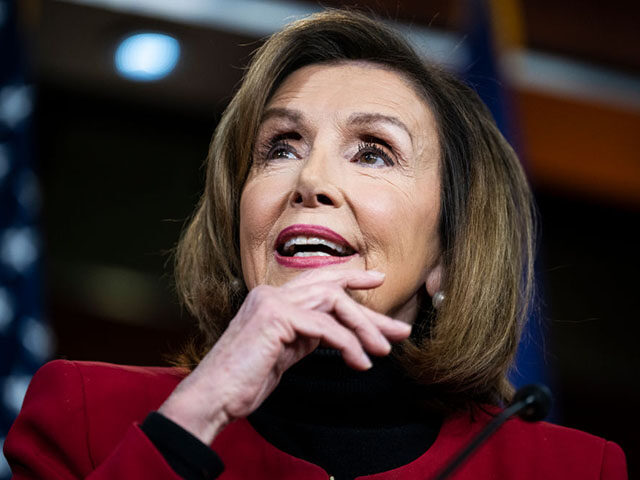More than half of the members of the U.S. House of Representatives voted remotely Friday for the $1.7 trillion government spending bill, claiming in proxy voting letters they could not be present to vote because of the “ongoing public health emergency.”
A total of 226 members from both sides of the political aisle used proxy voting to vote for the 4,000-plus page omnibus bill, the final vote of the 117th Congress, barring any unforeseen circumstances.
“Our nation has $31 trillion in debt, we’re suffering from record-high inflation, and we’re about to vote on a $1.7 trillion spending bill, a record-high spending bill, that’s going to aggravate these things, and more than half of the members of Congress have not shown up to vote on this bill,” Rep. Mike Garcia (R-CA), an Appropriations Committee member, said on the House floor ahead of the vote.
The option to vote by proxy, as well as to conduct committee proceedings remotely, was implemented in May 2020 because of surging cases of the Chinese coronavirus.
Tens of thousands of votes have since been cast by proxy because of the “ongoing public health emergency,” but as revealed in a congressional hearing in March, many members have been casting proxy votes not because of coronavirus but because of scheduling conveniences.
Rules Committee ranking member Rep. Tom Cole (R-OK) observed in the hearing that “magically proxy voting doubles on Fridays” while Administration Committee ranking member Rep. Rodney Davis (R-IL) noted members were proxy voting and working virtually “from vacation homes, fishing boats, and occasionally in the wee hours of the morning from the comfort of their own bed.”
Friday’s vote comes just before Christmas and New Year’s as members have already left or are attempting to leave D.C. for the holidays, a heightened challenge as airlines cancel thousands of flights amid extreme winter weather sweeping across the U.S.
Proxy voting “changed the nature of the institution, and not for the better,” Cole said during the hearing, adding that “in failing to routinely come together in person we’re losing our ability to learn each others’ stories” and that the House has therefore seen a “decline in civility.”
An analysis by Cronkite News found Democrats have voted by proxy “far more” than Republicans, and that the top ten most frequent proxy voters were all Democrats.
Thanks to proxy voting, closed offices have become a well-known feature along the halls of the House. At least one member, Rep. Kai Kahele (D-HI), was found to have been almost entirely absent from Congress this year, voting by proxy all but five times as of April 2022, according to Hawaii Public Radio.
House GOP Leader Kevin McCarthy (R-CA) railed against those “who don’t show up for work” in his floor speech Friday ahead of the spending bill vote. McCarthy has vowed to end proxy voting should he be elected speaker on January 3 when the majority flips to the GOP.
McCarthy noted the glaring number of proxy votes on the omnibus bill was “the first time in history” more than half the House was physically absent for passage of a bill:
Rep. Ashley Hinson (R-IA) called the end-of-year proxy voting “unacceptable”:
Rep. Chip Roy (R-TX) pressed on the House floor if a “quorum” could truly be present for the vote when enough members were not physically in the chamber:
Rep. Mike Gallagher (R-WI) contended during the hearing in March that “the over, overwhelming majority of members proxy voting are lying”:
“It’s not about COVID. … It’s about birthdays, graduation parties. It’s about the birth of children. It’s about strokes. That’s a different thing,” Gallagher said. “I think it is exacerbating a lack of trust in the institution because so many members are lying. How can you maintain the integrity of the institution if you’re institutionalizing lies?”
The notion of an existing public emergency was quashed by President Joe Biden in September, when he declared during a 60 Minutes interview that the pandemic was “over.”
The likely last proxy votes cast, ostensibly because of the “public emergency,” under House Speaker Nancy Pelosi’s (D-CA) reign were for a gargantuan spending bill Republicans overwhelmingly opposed.
The bill, passed first in the Senate with help from Senate GOP Leader Mitch McConnell (R-KY) and 17 other Republicans, contained an estimated $15 billion in earmarks (i.e., pet projects), about $45 billion in funding for Ukraine, hundreds of millions of dollars in funding for border protection in other countries like Egypt and Tunisia, and more.
Rep. Dan Bishop (R-NC) called it “America Last in action”:
Garcia noted during remarks on the House floor on Friday several “cold” features of the bill that competed with the “cold” winter storm, including the “cold” fact that more members were present for Ukrainian President Volodymyr Zelensky’s visit to Congress on Wednesday than for the bill vote.
Garcia said, “The fact that we this week had more members of Congress show up to listen to a speech by a president of a foreign nation than to vote on the annual operating budget for our entire nation is cold.”
The spending bill passed 225 to 201 with one member voting present and is now headed to Biden’s desk for signature. Biden is expected to sign the bill within the next week, effectively funding the government until September 30, 2023.
Write to Ashley Oliver at aoliver@breitbart.com. Follow her on Twitter at @asholiver.

COMMENTS
Please let us know if you're having issues with commenting.